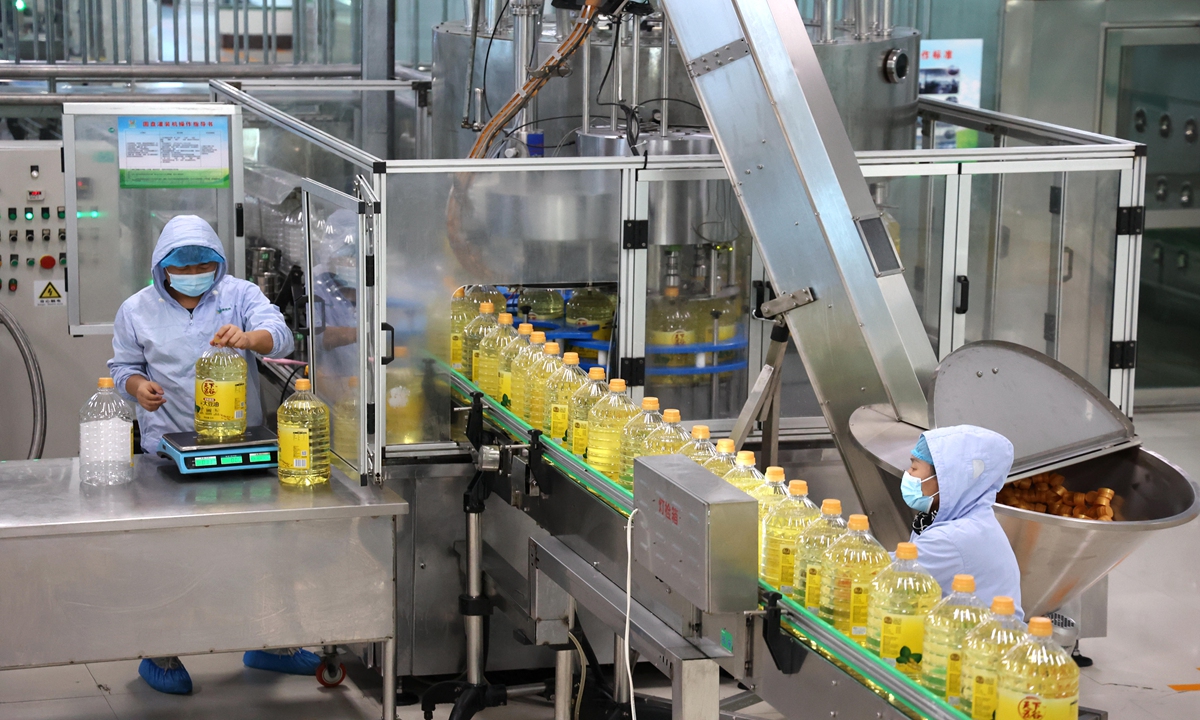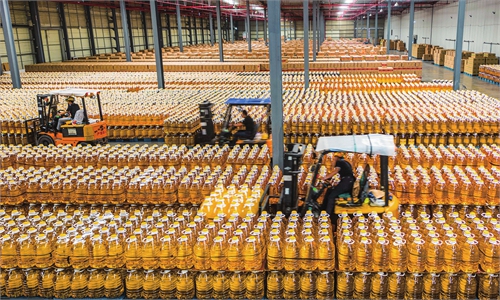China’s food safety authorities issue report on improper use of tanker trucks in edible oil transportation, stressing 'zero tolerance' for illegal activities

Workers process edible oil at a factory in Boxing county, East China's Shandong Province on January 8, 2024. With the approach of the Spring Festival holidays, which begin on February 10, demand for edible oil is rising, and manufacturers are scaling up production to meet the peak in market demand. Photo: cnsphoto
The office of the food safety commission under the State Council, China's cabinet, issued a report on Sunday on the investigation and handling of issues related to the improper use of tanker trucks in edible oil transportation, as reported by media outlets.
According to a report by the joint investigation team under the office of the food safety commission, it was determined that the incident was "extremely severe in nature." It violated basic common sense, trampled on moral and legal boundaries, and was a typical example of illegal and criminal behavior that must be severely punished, according to the report.
The office pledged to conduct a thorough and ongoing special rectification of issues related to the transport of edible vegetable oil in chemical tankers, while adopting a "zero tolerance" approach to all forms of illegal and irregular activities.
This followed a report by The Beijing News newspaper, which revealed a scandal involving the mixed use of tankers for edible and chemical oil, which sparked public concern.
In response to such media reports, the joint investigation team was set up to look into the reported improper use of tanker trucks in the transportation of edible oil, according to the Xinhua News Agency on July 9.
This team conducted joint investigations in North China's Hebei Province, Tianjin, Inner Mongolia Autonomous Region, and Northwest China's Shaanxi Province in order to trace the flow of the involved products, verify the illegal activities of the responsible individuals and entities, analyze the causes of the problems, and clarify the responsibilities of all parties involved.
The legal representatives and owners of the relevant transportation fleets, totaling five individuals, have been dealt with according to the law.
Another three individuals received a penalty of 10 days of administrative detention.
The seven companies involved were fined 260,000 to 2.86 million yuan ($36,500-$400,000), in accordance with the law.
Additionally, a nationwide comprehensive inspection and clean-up of the entire supply chain has been organized. Based on inspections in various regions, no other similar issues have been discovered to date, according to the office of the food safety commission.
China's Food Safety Law, Regulation on the Administration of Grain Circulation, and other laws and regulations clearly stipulate that "containers, utensils, and equipment used for storing, transporting, and handling food must be safe, non-toxic, and clean."
However, some enterprises and individuals have violated basic common sense, and trampled on moral and legal boundaries, and their actions were extremely severe, representing typical illegal and criminal behavior, the office of the food safety commission said.
The office of the food safety commission pledged to conduct a thorough and ongoing special rectification of these issues and adopt a "zero tolerance" approach to all forms of illegal and irregular activities, with severe penalties for violations.
The office will enhance management across the entire supply chain, improve regulatory coordination mechanisms, and ensure the safety of edible vegetable oil.
Global Times

